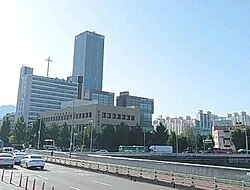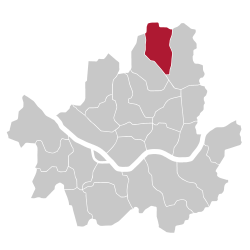Dobong District
Dobong
도봉구 | |
|---|---|
| 도봉구 · 道峰區 | |
 Skyline of Chang-dong | |
 Location of Dobong District in Seoul | |
| Coordinates: 37°41′42″N 127°02′49″E / 37.69500°N 127.04694°E | |
| Country | South Korea |
| Region | Sudogwon |
| Special City | Seoul |
| Administrative dong | 14 |
| Government | |
| • Body | Dobong District Council |
| • Mayor | Oh Un-seok (오언석) (People Power) |
| • MNAs | List of MNAs |
| Area | |
| • Total | 20.8 km2 (8.0 sq mi) |
| Population (September 2024[1]) | |
| • Total | 304,255 |
| • Density | 15,000/km2 (38,000/sq mi) |
| Time zone | UTC+9 (Korea Standard Time) |
| Postal code | 01300~01599 |
| Area code | 02-9xx,2000~ |
| Website | Dobong District official website |
 | |
Dobong District (Korean: 도봉구; RR: Dobong-gu) is one of the 25 districts of Seoul, South Korea. As of 2020, Dobong has a population of 315,979 and an area of 20.71 square kilometres (8.00 sq mi), and is divided into four administrative neighborhoods. The district is located in northeastern Seoul, bordering the Gyeonggi Province cities of Yangju and Uijeongbu to the north, and the districts of Gangbuk to the southwest and Nowon to the east.
History
[edit]Dobong District was created in 1973 by splitting 22 administrative neighborhoods off from Seongbuk District. By 1979, some of these 22 original administrative neighborhoods had been subdivided, increasing the number of administrative neighborhoods in Dobong District to 35.[2] In 1988, the sixteen administrative neighborhoods in Dobong-dong, Chang-dong, Wolgye-dong, Gongneung-dong, Hagye-dong, Junggye-dong, and Sanggye-dong were split off to form Nowon District, though the following year Dobong-dong and Chang-dong were returned to Dobong District.[3] Then in 1995, the 18 administrative neighborhoods in Mia-dong, Suyu-dong, and Beon-dong were split off to form Gangbuk District, leaving Dobong District with its present 14 administrative neighborhoods.[2]
Symbols
[edit]Mountain
[edit]Dobongsan (Dobong Mountain) is a mountain in Bukhansan National Park, partly under the jurisdiction of Dobong District. It is a popular leisure spot for district residents.
In addition, Dobongsan has many large and small temples such as Cheonchuksa, Wontongsa, and Manweolam.[4]
Administrative divisions
[edit]
Dobong District is composed of four legal-status neighborhoods (법정동) which comprise a total of 14 administrative neighborhoods:
- Dobong-dong (도봉동 道峰洞) 1, 2
- Banghak-dong (방학동 放鶴洞) 1, 2, 3
- Ssangmun-dong (쌍문동 雙門洞) 1, 2, 3, 4
- Chang-dong (창동 倉洞) 1, 2, 3, 4, 5
Transportation
[edit]Railroad
[edit]- Korail
- Seoul Metro
- Seoul Subway Line 4
- (Nowon-gu) ← Chang-dong — Ssangmun → (Gangbuk-gu)
- Seoul Subway Line 4
- Seoul Metropolitan Rapid Transit Corporation
Education
[edit]Sister cities
[edit] Changping, China
Changping, China Donghae, South Korea
Donghae, South Korea Iloilo City, Philippines
Iloilo City, Philippines
Notable people
[edit]- Lee Tae-min (born 1993), singer-songwriter, dancer, actor, and member of SHINee and SuperM
- Lee Seung-gi (born 1987), singer, actor, host, and entertainer
- Son Hyun-woo (손현우, born 1992), singer, dancer, actor, and member of Monsta X
- Yoon San-ha (윤산하, born 2000), singer and member of Astro
References
[edit]- ^ "Population statistics". Korea Ministry of the Interior and Safety. 2024.
- ^ a b 도봉구(道峰區) [Dobong District]. Encyclopedia of Korean Culture. Academy of Korean Studies. Retrieved 20 September 2020.
- ^ 노원구(蘆原區) [Nowon District]. Encyclopedia of Korean Culture. Academy of Korean Studies. Retrieved 25 September 2020.
- ^ "DOBONG-GU OFFICE". eng.dobong.go.kr.
External links
[edit]- Official site (in Korean)
- Official site (in English)

